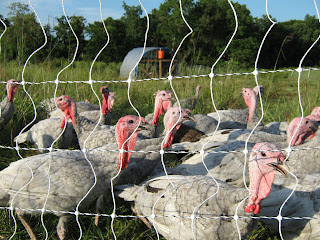A hen's laying cycle is coordinated to the amount of light in each day. Generally speaking, the more light in the day, the more eggs. With the passing of the winter solstice on December 21, we pass the mark at which the days cease to get shorter, and begin the slow, steady march to summer. So I thought I'd do an official egg count, and post every week or so the increase in egg production for us all to watch. One central thing I'm interested to note is how long it takes to go from minimal to maximal production. There are roughly 130 hens out on pasture and another 20 or so roaming the yards closer to the house.
On December 21, the egg count was 5 dozen exactly.
On December 21, the egg count was 5 dozen exactly.





























































